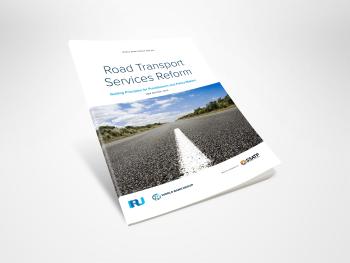IRU was back in Togo recently at a major international seminar on transport and research in Sub-Saharan Africa presenting, with the World Bank, how countries can reform their road transport sector to transform mobility and trade.
High accident rates, elevated transport costs, low profitability, lack of professionalisation, along with security and environmental challenges, block economic and social development, notably in emerging markets.
The causes run deep: outdated regulations, weak governance, poor regulatory and commercial compliance, absence of training and robust certification, and lack of support for formal and compliant operators.
What can be done?
IRU and the World Bank, with the contribution of the Africa Transport Policy Program (SSATP), have published a new comprehensive road transport sector reform guide to help governments, public authorities and practitioners tackle these issues.
The guide aims to help governments implement a cooperative and inclusive approach with the private sector to address challenges with clear reform pathways.

Speaking at the seminar, “Le 10e Séminaire International sur les Transports et la Recherche en Afrique Sub-Saharienne”, organised by SITRASS, in the Togolese capital of Lomé, IRU Senior Adviser Jean Acri said:
“There can be no trade development and regional integration dynamics in Africa without a structured and efficient transport sector.
“We need to advance a comprehensive approach to sectoral reform. That is exactly what the IRU and World Bank sector reform guide for decision-makers and practitioners sets out to do.”
The guide, which comprehensively updates the 2016 edition, reflects changing technology, trade and mobility trends and user expectations. It also addresses passenger transport, gender dynamics, training environments, and decarbonisation.
Key areas for reform include:
- Creating an enabling environment
- Professionalising the sector
- Providing vocational training and building training centres
- Eliminating market access restrictions
- Upgrading vehicles
- Decarbonising transport
- Managing externalities
“Addressing infrastructure shortfalls alone is not enough to unlock efficient and sustainable mobility for people, businesses and communities across Africa,” said Jean Acri.
“We need to provide the other conditions needed, such as formalising and professionalising access to the driver profession, including training capacity, market access and improved operating conditions, to unleash the potential of road transport. Strong political will is essential to make this happen,” he added.
About the reform guide
The IRU–World Bank–SSATP guide is a unique reference that lays out a step-by-step approach to help governments and authorities, in partnership with the private sector, diagnose issues in their national passenger and goods road transport sector – and define and implement a comprehensive path to reform.
The updated publication also relies on the concrete implementation experience behind a major transport reform project in Togo. With the support of the World Bank, IRU helped modernise, formalise and professionalise Togolese road transport.
